

Teaching With Podcasts. What Do Parents Think About Mobile Learning? Photo credit: iStockPhoto Mobile devices are coming to school.The Learning First Alliance (where I am deputy director) and Grunwald Associates, with support from AT&T, recently released Living and Learning with Mobile Devices , which examines parents' attitudes towards mobile devices as learning tools.
This survey, completed by parents of children age 3 to 18, found that 51 percent of high school students carry a smartphone with them to school every day -- so do 28 percent of middle school students and 8 percent of elementary school students. Many in the education community recognize the transformative power of these types of devices, which have the potential to increase student engagement, allow educators to more easily personalize learning experiences, and provide students quick access to an enormous amount of information. But are schools using mobile devices for learning? In many cases, no. The “One iPad” Classroom. If you have been allocated just one iPad for your classroom then you have very different issues to 1-to-1 classrooms as the iPad is not designed as a shared device.
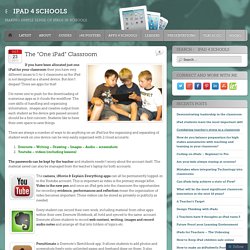
But don’t despair! There are apps for that! I’m never one to push for the downloading of numerous apps as it clouds the workflow. The core skills of handling and organising information, images and creative output from each student as the device gets passed around should be a first concern. Personalized Learning Chart Version 2. Mimi Ito on Learning in Social Media Spaces (Big Thinkers Series) Elyse Eidman-Aadahl on Writing in the Digital Age (Big Thinkers Series)
79 "Student Literacy and Social Media" @TeachThought @tysonkimberly. Jeff sits down with Terry Hieck and Kimberly Tyson to talk about student literacy and how we can help our children navigate through the 21st century.
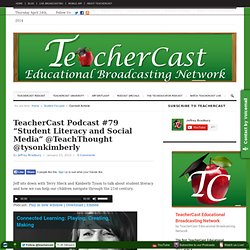
Podcast: Play in new window | Download | Embed Connected Learning: ‘PLAY’ from DML Research Hub on Vimeo. About Teach Thought TeachThought’s mantra is simple: learn better. Our mission is modest enough–to create a modern enlightenment that results in healthy communities and truly interdependent citizens. We believe that this can happen much more simply than it’d seem. This requires new tools and models, but more importantly a paradigm shift in how people thinking of the learning process–and all people, not just educators. And we all can learn better. Process In pursuit, we’re starting small. Our pathway beyond that involves content, apps, and the kind of connectivity that can reach anyone on the planet at any given time—and in the process replacing consumption with production, and making it cool again to be smart. Featured Topics Featured Links. Watch. Troy Hicks: A Conversation About Digital Writing. "There is not a writer in our classrooms today who will not be producing something with a digital writing tool in her or his lifetime.
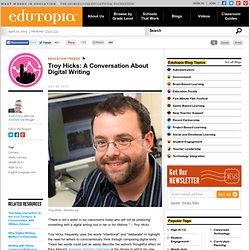
" -- Troy Hicks Troy Hicks frequently uses the words "intentional" and "deliberate" to highlight the need for writers to conscientiously think through composing digital texts. Those two words could just as easily describe the author's thoughtful affect on Paul Allison's Teachers Teaching Teachers or the degree to which his new book, Crafting Digital Writing: Composing Texts Across Media and Genres, methodically articulates how 4th-12th grade instructors can introduce technology tools, mentor texts, composing practices, and heuristics for helping students write.
Online Learning Infographics. I have recently been shocked at the fact that educators don’t really see the need for a rubric.
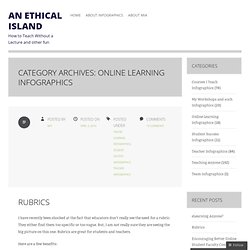
They either find them too specific or too vague. But, I am not really sure they are seeing the big picture on this one. TeachThought - Learn better. Purpose of technology. 20 Questions To Guide Inquiry-Based Learning. 20 Questions To Guide Inquiry-Based Learning Recently we took at look at the phases of inquiry-based learning through a framework, and even apps that were conducive to inquiry-based learning on the iPad.
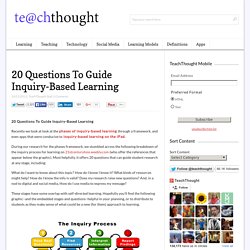
During our research for the phases framework, we stumbled across the following breakdown of the inquiry process for learning on 21stcenturyhsie.weebly.com (who offer the references that appear below the graphic). Most helpfully, it offers 20 questions that can guide student research at any stage, including: Definition Of Digital Citzenship. The Definition Of Digital Citizenship by Terry Heick As more and more students interact digitally–with content, one another, and various communities–the concept of digital citizenship becomes increasingly important.
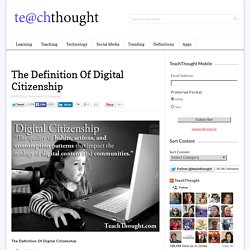
Which begs the question: what is digital citizenship? Well, first citizenship, which is formally defined as “the quality of an individual’s response to membership in a community.” This makes citizenship far more complex than a simple legal matter, but rather one that consists of self-knowledge, interaction, and intimate knowledge of a place, its people, and its cultural history. So digital citizenship is nearly the same thing–“the quality of a response to membership in a digital community” would be a good first crack at the definition.
How 21st Century Thinking Is Just Different. How 21st Century Thinking Is Just Different by Terry Heick This content is proudly sponsored by The Institute for the Habits of Mind, promoting the development of personal thinking habits in 21st century learners.

In an era dominated by constant information and the desire to be social, should the tone of thinking for students be different? After all, this is the world of Google. In this world full of information abundance, our minds are constantly challenged to react to data, and often in a way that doesn’t just observe, but interprets.